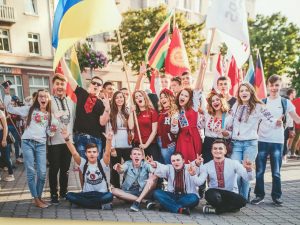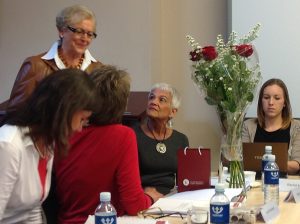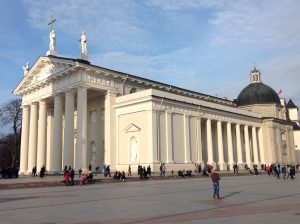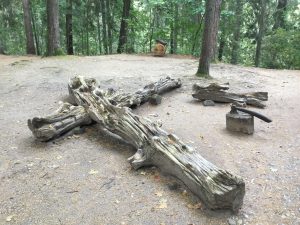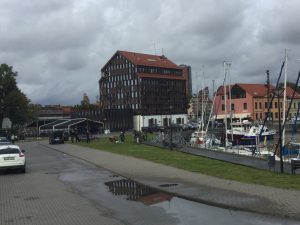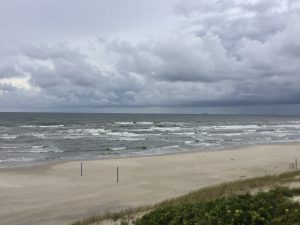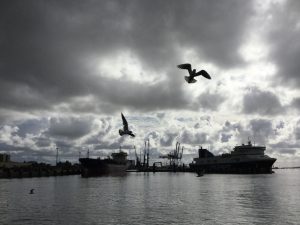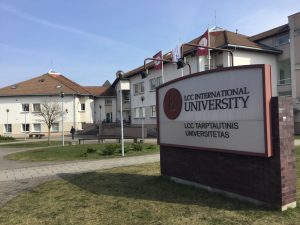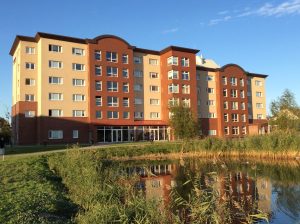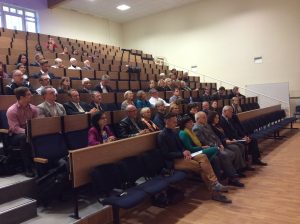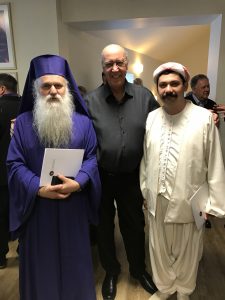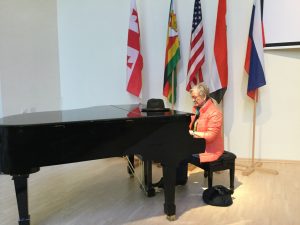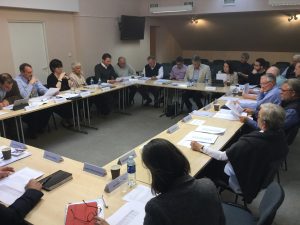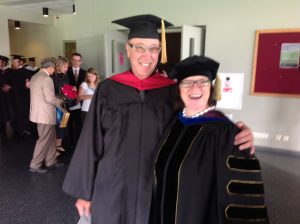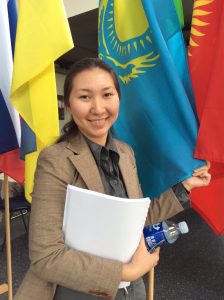A political statement in the shape of a University
A Soviet bible smuggler, a Lithuanian Social Entrepreneur and an American Academic joined Leona and myself as we negotiated the sandbag barriers (intended to slow down Soviet tanks) to enter the Lithuanian Parliament Building. That sounds like the setup for a joke but it was a deadly serious event.
It was November 10, 1990. In March of that year Lithuania had been the first Republic to declare its independence from the Soviet Union. The dramatic coup and the events of August 1991 that effectively ended the Soviet Union were part of an unknown future – and Leona and I would be there as well to witness and participate.
Our objective on this day was to respond to the request from the self-declared ‘Government’ occupying the Parliament to establish an English-language University in a future independent Lithuania. It was understood as part of the process of re-orienting an occupied Lithuania away from the political embrace of Moscow as well as the stifling and corrupt Soviet educational model.
We celebrated the 25th anniversary of LCC International University in April 2017.
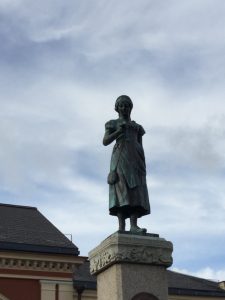
Anneke – a powerful symbol of resistance. When Hitler arrived at the conquest of Lithuania he spoke from a balcony. The statute of Anneke had her back to Hitler and entire crowd joined her in silent but powerful protest.
The Berlin Wall had come down in late 1989 but the Soviet Union was still alive and well. After limited violence in Vilnius, Gorbachev had decided to allow a stalemate. Our little venture and others were willing to fill that void with ideas and initiatives. History would be written but the future narrative was totally unknown.
We met the 29 year-old self-declared Minister of Education and agreed to establish an English-language North American style Liberal Arts University. Between us we had an early version of the PC and a portable printer. In a Parliament denied power by the Soviets we managed to record a draft of the Memorandum of Agreement on the computer and squeeze out a couple of copies before we lost all power. We signed in the half-light and celebrated with warm champagne!
The Lithuanians proposed the rural City of Panevezys as the location. Since we were not familiar with that City we left a blank on the document. The next day we visited the site, met with Civic authorities, filled in the blank and all initialed the decision. The selection of Panevezys would have consequences.
The program started in July 1991 with a 6-week English summer school for eager and anxious high school graduates plus hopeful future English teachers. Teachers of the Russian language were reading the political tea leaves and guessing that their future might be in the teaching of English rather than Russian! The English studies went extremely well – but the response on the street and in the community was less welcoming.
Lithuania is dominated more by its Catholic experience than virtually any other country in Europe. Catholicism was often a substitute for nationalism or patriotism and as a result was severely suppressed by the Soviets – together with any other form of religious expression. Senior clerics were persecuted and many in the current leadership had spent the intervening years in Siberia – thereby missing Vatican I and II plus most modernizing and moderating influences of the late 20th century. This history was to play out in our project.
We were greeted on arrival to start the summer program with an article in the National newspaper with the headline….
“And how shall we answer Art DeFehr?”
This was a consequence of a public letter from the senior Catholic cleric demanding that our project not be allowed to proceed. The rationale was that we were sponsored by Protestant Christians and Lithuania should be restored to its unitary Catholic past. The argument was further made that we represented a ‘sect’ and were therefore more dangerous – by ‘sect’ he was referring to my Mennonite background.
We arranged to meet the local Bishop. After some discussion I asked the following question. Assuming we were sponsored by and represented Mennonites – why was that so offensive? The Chicago-trained priest doing the translation then volunteered his own answer in perfect English – “If there would be too many Anabaptists in Lithuania (using the 16th century theological expression rather than the term Mennonites – referring to the pacifist position of this group) then who would fight the Russians!” We were amazed that we were right back in the middle of the Reformation – and that would not be the last time.
This continued with an all-of-society meeting where the feelings between collaborators (those who managed to stay in Lithuania to deal with the Soviets) or patriots who had been exiled to Siberia resulted in hours of rancorous debate – having nothing to do with our University.
For anyone concerned – we are pleased to advise that time and experience heals – today LCC enjoys excellent relations with local and national Catholic and all other religious authorities. In fact, LCC is the convener of most ecumenical activities in the country.
These attacks did have important consequences relative to location. In January 1991, I attended the World Economic Forum in Davos. All of the leaders of the very recently independent former Soviet Republic had been invited. I arranged to meet President Lansbergis of Lithuania – who also happened to have been elected in the constituency where LCC was located. His first question was – “Are you a Mission or a University?”
Lithuanians know their history – the nation had initially responded well to Calvinism. This was reversed in the Counter-Reformation by Jesuit intervention specifically through the role of their own University – now Vilnius University. The Catholic authorities had respect for the potential of educational institutions and therefore the suspicion of LCC.
I reminded him that the keynote address to the Davos audience the previous evening by the senior Catholic prelate of Milan was titled “Your Vocation is your Mission.” I responded that we are motivated to come to Lithuania to serve because we are Christians – but we come as professionals to teach – and will teach from that perspective. He then made the interesting comment. “If I support LCC I will lose the next election – but if I fail to support LCC then I deny my principles – would you consider relocating to the Port City of Klaipeda.” His rationale was that the coast of Lithuania which includes Klaipeda – the historic Hanseatic League City of Memel – had a different and more diverse religious experience and would be more accepting of a Protestant institution.
The experience in Panevezys that winter included violence against our young female students so we were motivated to consider alternatives. We visited Klaipeda. Before the meeting started the mayor related a fascinating story.
“In 1542 two Protestant scholars arrived in Memel to found a University. The town authorities considered the matter and denied permission. The two scholars walked 100 km down the coast and founded what was to become the famous University of Koenigsberg. (known for scholars like Emmanuel Kant) We missed the opportunity to have a University n 1542 – we will not miss our second opportunity!” Incredible – we were re-living the Reformation and history going back to the Hanseatic League!
LCC relocated to Klaipeda in the summer of 1992. Further challenges would involve issues such as accreditation. During the term of President Valdas Adamkus who had been raised in America there was an opportunity. Adamkus understood the Liberal Arts concept and accreditation was achieved through an Act of Parliament. The EU had decided to ‘grandfather’ most existing institutional arrangements as new members joined – resulting In effective accreditation for LCC inside the EU.
There were many more adventures and some misadventures as we navigated the change from the Soviet Empire to an independent Lithuania to the EU. There was a change in currency from the lita to the Euro. The vestiges of the Russian Empire decided to make life interesting by collapsing in 1997, then returning to nationalism and expansion under Putin in more recent years.
As crisis management eventually changed to a more normal existence – a very relative term in that environment – actions were taken such as buying a site and building a modern campus. LCC has four modern facilities. These include an Academic building, a state-of -the-art Gymn and two purpose-built dormitories- all located on a premium site with a small lake at the center.
Two developments have shaped strategy for LCC. The first was the demographic impact of accession to the EU resulting in greater access to Europe for Lithuanians. 25% of the Lithuanian population has emigrated since independence and this includes a disproportionate share of youth as they search for opportunities outside of Lithuania. This has reduced the number of students available to study at LCC. The reality is that LCC was never intended as a Lithuanian University but was designed to serve students from the former Soviet Union. The objective was the development of graduates with a different sense of civic purpose and appreciation and experience of a more open society.
The response of LCC has been to develop a sophisticated recruitment system in the countries East of the EU. This includes Ukraine, Russia, the Stans: Moldova, Georgia plus new markets such as Albania. This has been very effective but complicated by the impact of the Russian adventures in the Ukraine with political ramifications but more important the severe negative impact on all regional currencies. Current enrollment includes students from 30 countries.
More recently LCC initiated the Middle East Scholars program. This is a special program designed to create opportunity for war-affected students in areas such as Syria and northern Iraq. The first group includes Yezidi, Iraqi Christian and Syrian Muslim and Christian students – of which 40% are female. The challenges include selection, access to visas, travel, matching educational background and expectations, absence of any financial ability plus the unique political dynamics. The trauma experienced by this group simply adds to the challenges. This is an experiment to create international pathways for war-affected students. We expect some to complete at LCC and others to transfer to Universities worldwide. We all note the global discussion about migrants and hope to provide real opportunity to these individuals but also to shake up the global system that deals with – or rather does not deal with youth in trouble.
How does LCC survive under these challenging circumstances? LCC receives no significant funds from Lithuania and is not supported by any local or international NGO, church denomination or international Government. The modern campus is fully paid for, LCC has no debt and has never experienced a deficit. Students pay a modest tuition but the majority receive financial assistance. How does LCC manage to exist?
First, students do pay tuition plus dormitory fees. Student and other program revenue cover 75% of the budget.
A critical element of LCC survival has been a loyal, committed and generous group of friends in Canada, the USA and Europe. This group has provided a consistent base of financial support and at times extraordinary donations to build the campus.
The most important explanation for the survival of LCC is the unusual strategy of relying on volunteer staff or more frequently described as externally-supported staff. Support may come from their friends or churches but in very many cases the sacrificial time and funds come from the volunteer. Volunteer staff may come for a summer, semester but many come for up to 10 years! They come because they are committed but also because the experience is personally rewarding. An incredible 2000 volunteers have served at LCC during these 25 years!
LCC understands itself as a unique institution on the border between East and West, between the democratic traditions of Europe and the authoritarian legacy to the East. The intellectual foundations of LCC are firmly grounded in Western ideas of Democracy and an open Civil Society. However it addresses these values from the perspective of Christian teaching. It speaks of transforming society through the transformation of its graduates. When LCC students engage in debate and business games in Europe there is frequently an observation that LCC students are more likely to shape their contributions from the perspective of values and ethics to the degree that is noticed.
LCC currently provides baccalaureate and masters programs to 500 students plus approximately 80 North American and European students who join for an ‘international semester’. There is a large summer program plus several remote summer language institutes in places such as Georgia or Russia. The campus is host to both national and international educational seminars, conferences and various special study programs.
Students are housed in dormitories designed as self-contained apartments for 4-5 students. LCC will typically mix students from different countries and traditions to reinforce the learnings about culture and diversity.
LCC is ‘owned’ by two charities – one based in Canada and another in the USA. The board come from Canada, USA, Western Europe, the former Soviet Union, Lithuania plus faculty and students. Board members attend in Klaipeda twice each year, are not compensated and pay their own travel and lodging expenses.
LCC has been challenged over these 25 years by political events, currency changes, recessions East and West, demographic earthquakes plus the need to consistently meet rising academic expectations. By all rights it should not exist and arguably should never have been founded. A number of educational initiatives were launched after the fall of the Soviet Union and virtually all have succumbed to the challenges.
The survival of LCC is a tribute to capable and experienced leadership, fantastic staff, a committed board, generous donors and an accepting political environment. Finally it is a tribute to students who have risked their careers and future initially to an institution that was totally outside of European ideas of education.
More than 1,800 graduates have moved on to many of the best graduate schools around the world and have been eagerly employed especially by international companies and Governments. An encouraging number have chosen to stay in the region to build their own societies.
A visit LCC is to believe in miracles!

